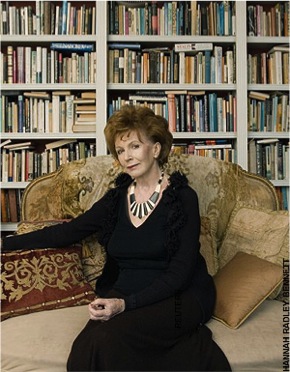The portrait of an ideal lover
 The Irish novelist Edna O’Brien, who ten years ago had written the leading biography of James Joyce, is now presenting the book “Byron in love: A Short Daring Life”. In this work, recreates the explosive portrait of the romantic poet and ideal lover, who was born with a lame right leg, but gave the charming face of the ideal model for many painters of his era. Edna O ‘Brien talks about the exciting, controversial and highly erotic personality of a great visionary whose life was connected with Greece in the most tragic way.
The Irish novelist Edna O’Brien, who ten years ago had written the leading biography of James Joyce, is now presenting the book “Byron in love: A Short Daring Life”. In this work, recreates the explosive portrait of the romantic poet and ideal lover, who was born with a lame right leg, but gave the charming face of the ideal model for many painters of his era. Edna O ‘Brien talks about the exciting, controversial and highly erotic personality of a great visionary whose life was connected with Greece in the most tragic way.
Elpida Pasamichali
After having written, almost ten years ago, the biography of James Joyce, how did you decide to write the biography of George Gordon Byron?
I decided to write about Lord Byron because I had written four novels since my book on Joyce, believing, mistakenly as it turned out, that it would not be as arduous or time consuming as a novel. In fact, it took me the best part of three years, what with research and obstacles.
Which was your inspiration for this book? Are you an admirer of Byron’s charismatic personality and Romantic myth?
My inspiration was the dazzling collection of Byron’s Letters and Journals, edited by Leslie A. Marchand. No writer has been so revealing, so discursive, so witty and so intelligent, regarding his own wayward life and the world at large.
 “His precociousness as a young boy was touching,
“His precociousness as a young boy was touching,
his snobbishness as an undergraduate absurd,
his lavishness endearing”
Could you please tell us about your feelings towards Byron before writing the book and after the book had been finished?
Before starting to write the book and having read and memorised much of his poetry, I did indeed see him as the romantic poet who built around himself a citadel of myth. While writing it, I often changed in my opinion of him. His precociousness as a young boy was touching, his snobbishness as an undergraduate absurd, his lavishness endearing and his necessity to always be in love, a trait I could identify.
“Considering his untimely death in Greece,
one could not but feel a terrible sympathy
for a great and misguided man”
How do you comment on Byron’s relations with women?
His treatment of women and particularly of Annabella Milbanke, his wife, was callous, if not to say demented. Worse was the fate of the daughter, Allegra, whom he fathered with Claire Clairmont. Having insisted on adopting the child, he then sent her at the age of three to a convent in Italy, complaining that she was possessed (not unlike himself) “of a devil of a spirit.” But it must also be said that Byron’s excoriation of himself was remorseless and he was horrified, as he told the poet Tom Moore, at casting up his own moral accounts. Love, as he put it, was a mixture of the good and the diabolical and he was versed in both. After the book was finished and considering his untimely death in Greece, one could not but feel a terrible sympathy for a great and misguided man.
 “Byron himself said that
“Byron himself said that
he could not exist without
some object of affection”
“Byron in Love” follows the life of Lord Byron through his love affairs with uncounted soul mates of both sexes. What was, in your opinion, the role of love in Byron’s life?
Byron himself said that he could not exist without some object of affection. In many ways, he loved with the temperament of a woman and abandoned his love objects with the ruthlessness of a man.
Which is your personal view on Byron’s conviction that Greece was the country that made him a poet?
He believed that Greece was the matrix of great poetry and by his going there, scratching his name on a column at Delphi, he would in a sense be baptised as a poet.
Why was Byron historical figure? Do you think that he became famous more because of his life than his work?
It’s a complex scenario. His fame in his lifetime and ongoingly fed the myth of and aroused interest in his poetry. The two are inseparable.
 “Volcanic, unpredictable and answering,
“Volcanic, unpredictable and answering,
neither to the mores of man or of Gods.”
Finally which is your personal aspect about Byron? Was he an arrogant, ambitious, destructive and terrible person or was he a tender, generous, inspired and volcanic dreamer? Was he a genius or a demon in human form?
He was certainly ambitious and, as he wisely said to Shelley, “In the career of writing, a man should calculate upon his powers of resistance before he goes into the arena.” In the early days of his love affair with Lady Caroline Lamb, he wrote “Then your heart, my poor Caro (what a little volcano!), that pours lava through your veins; and yet I cannot wish it a bit colder…” It could easily apply to himself. Volcanic, unpredictable and answering, neither to the mores of man or of Gods.
 Greek Release of “Byron in Love: A Short Daring Life” by Metaixmio Publishers
Greek Release of “Byron in Love: A Short Daring Life” by Metaixmio Publishers
Related links
Συνέντευξη της Edna O’ Brien στα ελληνικά




